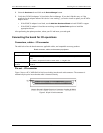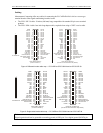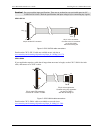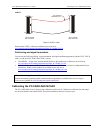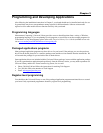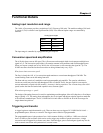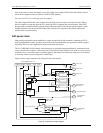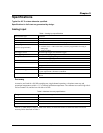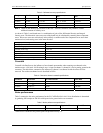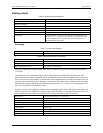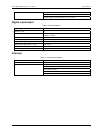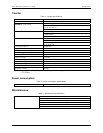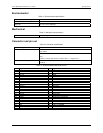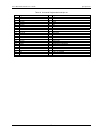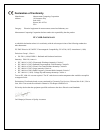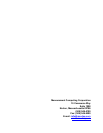
PC-CARD-DAS16/16AO User's Guide Specifications
Table 3. Calibrated accuracy specifications
le 3
Range Gain Error Offset Error
DLE
(Note 1)
ILE
(Note 1)
±10.00 V ±3 max ±1.5 max -1.0, +1.75 max ±2.0 max
±5.000 V ±3 max ±1.5 max -1.0, +1.75 max ±2.0 max
±2.500 V ±3 max ±1.5 max -1.0, +1.75 max ±2.0 max
±1.250 V ±3 max ±1.5 max -1.0, +1.75 max ±2.0 max
Note 1: These are the intrinsic specifications of the ADC. Software calibration may introduce a small
additional amount of linearity error.
As shown in Tab , total board error is a combination of gain, offset, differential linearity and integral
linearity error. The theoretical worst-case error of the board may be calculated by summing these component
errors. Worst case errors are realized only in the unlikely event that each of the component errors are at their
maximum level, and causing error in the same direction.
Analog input full-scale gain drift ±0.60 LSB/°C max
Analog input zero drift ±0.15 LSB/°C max
Overall analog input drift ±0.75 LSB/°C max
Common mode range ±10 V min
CMRR @ 60 Hz -76 dB min
Input leakage current ±20 nA max
Input impedance 10 MOhms min
Absolute maximum input voltage +55/-40 V (fault protected via input mux)
Crosstalk
Crosstalk is defined here as the influence of one channel upon another when scanning two channels at the
maximum rate. A full scale 100 Hz triangle wave is input on channel 1; channel 0 is tied to analog ground at the
connector. The table below summarizes the influence of channel 1 on channel 0 with the effects of noise
removed. The residue on channel zero is described in LSB's.
Table 4. Channel to channel crosstalk specifications
Condition Crosstalk Per channel Rate ADC Rate
±10.00 V 5LSB
pk-pk
50 kHz 100 kHz
±5.000 V 6LSB
pk-pk
50 kHz 100 kHz
±2.500 V 7LSB
pk-pk
50 kHz 100 kHz
±1.250 V 10LSB
pk-pk
50 kHz 100 kHz
Noise performance
Table 5
Table 5. Noise performance specifications
summarizes the noise performance for the PC-CARD-DAS16/16AO. Noise distribution is determined
by gathering 50K samples at 200 kHz with inputs tied to ground at the user connector.
Range % within ±2 LSBs % within ±1 LSB Typical LSBrms* Max LSBrms*
All ranges 78% 47% 1.8 4.7
* RMS noise is defined as the peak-to-peak bin spread divided by 6.6.
20



